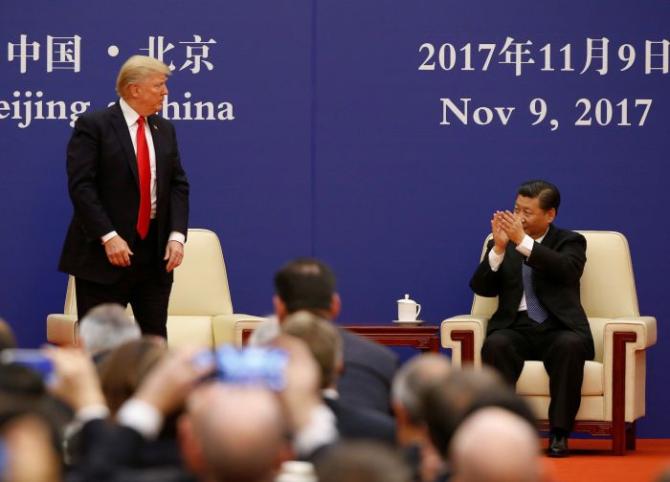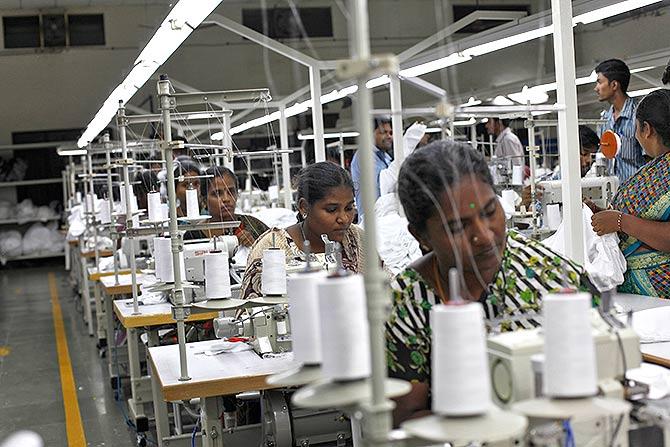'India has an advantage because we produce more cotton and we have more workforce.'

Soon after Commerce Minister Piyush Goyal took more than 12 major decisions to boost exports and industrial growth, Raja M Shanmugham, president, Tiruppur Exporters Association, wrote to the minister requesting him to come out with an alternative which was WTO compatible and something similar to the Merchandise Exports of India Scheme, till a free trade agreement was inked with the European Union, the UK and the Eurasian Economic Union.
Tiruppur in Tamil Nadu is a major textile and knitwear hub that contributes 90% of India's textile exports worth $200 billion, and it employs over 600,000 people.
"Only the textile industry can act as a saviour in India," Shanmugham tells Rediff.com's Shobha Warrier. "If there is a 5-fold increase in the market share of this industry, 6 months of BoT (Balance of Trade) can be addressed."
Why did you write to the commerce minister soon after he came out with the proposals to boost exports?
What the commerce minister said was exporters should not rely on the crutches of incentives and had to rely on their own strengths. The fact is, incentives are the ones that are helping the sustainability of the textile industry.
By incentives, do you mean subsidies and grants from the Centre?
You cannot call the script in the MEIS (Merchandise Exports from India Scheme: External link) to support the industry, as subsidy.
You should understand that we are competing against many countries in the world, and all our competitors have an advantage over us because of the support given to them by their governments.
For example, all the emerging economies like Bangladesh, Vietnam, Cambodia, Sri Lanka and Myanmar have either a bilateral agreement with EU, the US, etc or an underdeveloped status. So, they get tariff-free entry into those markets.
In comparison, India is devoid of this kind of a support because we do not have any FTA (free trade agreement) with EU or the UK or the US or Australia. Because of that, our products are tariffed high. So, we are at a disadvantage while competing with countries like Bangladesh, Cambodia, Vietnam, etc.
As companies cannot sign any bilateral agreements with other countries, it is the government's duty to help us.
Does that mean you want bilateral agreements with the EU, the UK, the US, Australia, etc?
Unless there is no agreement, there will not be any level playing field. Now, we are in a position where we are bound to get defeated.
Another problem that we face compared to China or even smaller countries like Cambodia and Vietnam is, we lack proper infrastructure facilities.
In order to compensate these two disadvantages, the government has to provide incentives to the industry.
In fact, incentives are needed not to pamper the industry, but they are needed for the very survival of the industry.

Why is it that India does not have bilateral agreements with the EU or the US when small countries have such agreements?
For the last 10 years, India has been trying, but they could not come to an agreement.
I am told the two factors that are creating problems are the automobile industry and winery. The EU wants free trade in both automobiles and alcohol which India cannot afford to give.
Almost all the European automobile companies have their production facilities in India. In comparison to the European models of the same company, Indian productions are expensive because of the heavy excise duty levied on them.
If India allows free trade for automobiles, the same model made there will be available here at a cheaper price. Naturally, it will have an adverse impact on the Indian automobile industry.
Similarly, if you sign an FTA in winery, all the foreign brands will flood the Indian market and they will wipe out local products.
So, you feel a trade agreement is unlikely to happen?
Yes. I am told because of the automobile industry and winery, it is very difficult for India to sign FTAs with these countries.
The Indian textile industry dominated the global market once.
Yes, you are right. We are in a disadvantageous position now compared to the smaller emerging countries. That's why we are asking for government support.
We want the government to take into consideration the number of jobs we are providing. This is what I want the commerce minister to look into.
It was also reported that the garment exports from Tiruppur grew by 8% in the first half of 2019 to Rs 30,000 crore. Is it not an encouraging sign?
Yes, it is a good sign. In the last two years, we were reeling under the effects of GST and demonetisation. But the industry started picking up well in the last six months and the growth has been extremely positive.
This happened because of the supportive systems that are in place. If the government were to remove the supportive measures, we would be back to where we were six months ago.
This is what we wanted to highlight to the minister as he is new to this ministry. In fact, we had appraised the earlier minister of the situation.
So, it took two years for Tiruppur to finally get rid of the demons of demonetisation and GST?
Actually, it took one-and-a-half years.
Demonetisation had little impact in Tiruppur, but GST had much more impact. That was because lots of technical glitches made the industry suffer a lot.
GST resulted in a drained condition of liquidity. Also, there were huge delays in tax repayment. It took one-and-a-half years for the industry to recuperate from all the injuries.
Here, I must thank the government for understanding the reality though it took some time for them to come out with corrective measures in the implementation of GST.
Now we are back into the growth trajectory and this trajectory has to continue.
I would say that in today's times, the demand for clothing only will grow for mankind, and not food.
Because of the dietary conditions, the consumption of food is reducing in proportion to the population.
On the other hand, conceptual changes are taking place in attire and this has become an ever-growing industry. That's why we want the government to give priority to this industry.
In India, we always look at agriculture as the employment generating industry. But it is not going to be as automation is happening very fast in agriculture.
On the other hand, because the textile industry is driven by the concept of design, automation has its limitations and it will happen only in the periphery. Manual intervention is absolutely essential in this industry.
So, I would say textiles is the only employment generating industry in the world.

Can the textile industry be one of the largest employment generators in India?
Yes, textile industry is a huge employment generator. So, the country's growth can happen only with the growth of this industry.
If the government wants more jobs to happen, it has to take care of this industry.
Around 6 lakh people work in the Tiruppur cluster itself.
Another interesting factor is, earlier we were more dependent on exports alone, but today, almost 50% of our production goes to the domestic market itself.
With such a growing market, all the major international brands like Puma, Jockey, Adidas, etc want to conquer the Indian market. So, all of them have presence in India.
As the readymade garment industry in Tiruppur consists of micro and small industries, we do not have a networking facility. What we do is, we network with the established domestic brands like Arvind Mills, Reliance, Big Bazaar, etc and also with the international brands.
I would say, in a populous nation like India, only the textile industry can act as a saviour.
In what way will the US imposing tariffs on China help India?
The trade war between the US and China will definitely be beneficial for India and other competing countries.
Compared to the other countries, India has an advantage because we produce more cotton and we have more workforce.
Two major things that are needed to run this industry are cotton and work force, and they are abundantly available in India.
But the government has to make use of this advantageous position to reality.
How much do you expect the readymade garment industry to grow in the next couple of years?
Right now, we have 3.8% to 4% of the global market share in the readymade garments market.
If we were to get government support with better infrastructure, clusters like Tiruppur, Ludhiana, etc can conquer 20% of the global market share.
If there is a 5-fold increase in the market share of this industry, 6 months of BoT (Balance of Trade) can be addressed.
Regarding jobs, at present Tiruppur alone employs 6 lakh people and 20 lakh people are employed across the country.
And if there is a 5-fold increase in the growth of this industry, you can imagine how many jobs we would be creating.
The minister wants the industry to not rely on the crutches of subsidies and grants from the Centre. But you feel the industry needs crutches for some more time.
I agree it is a good suggestion by the minister. But till there is good infrastructure and trade agreements with promising markets, we need crutches.
We will not need crutches once the government fulfils these two tasks.
Are you hopeful?
I am hopeful because there will be continuity in the government decisions.
There will not be any reversal of policies. Then, there will be swift action in correcting the mistakes identified earlier.











 © 2025
© 2025